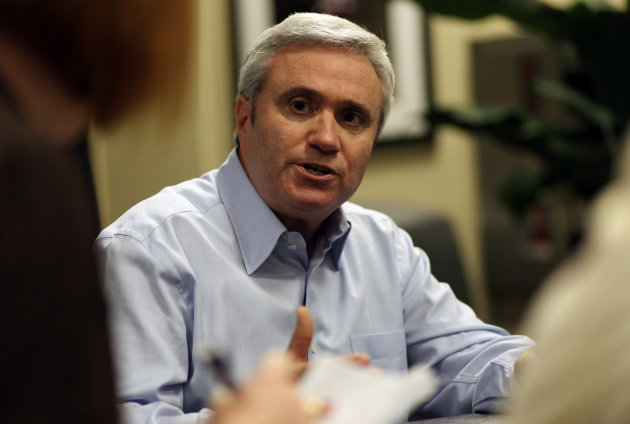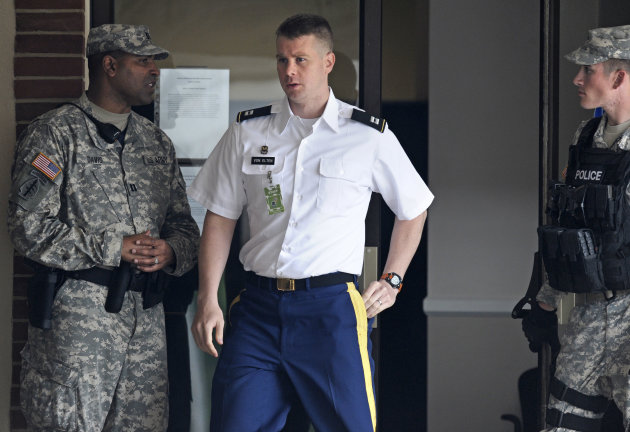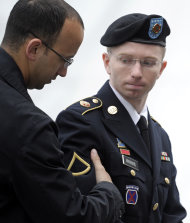FORT MEADE, Md. (AP) — Army Pfc. Bradley Manning's court-martial for giving hundreds of thousands of sensitive documents toWikiLeaks entered its second week Monday in a fresh spotlight cast by a brand-new leak by another low-level intelligence employee.
Like Manning, Edward Snowden could find himself hauled into court by the U.S. government after he unmasked himself Sunday as the leaker who exposed the nation's secret phone and Internet surveillance programs to reporters.
Legal experts closely following both cases said they were shocked to find out young, low-ranking people had such access to powerful government secrets. Manning was 22 when he turned over the military and diplomatic cables about three years ago; Snowden is 29.
"In that respect, these cases suggest we should be much more careful about who is given security clearances," said David J.R. Frakt, a former military prosecutor and defense lawyer who has taught at several law schools.
At the same time, legal experts saw differences between the two cases, namely that Manning's secret-spilling was more scattershot, while Snowden appeared more selective.
"I'm not awarding him the Presidential Medal of Freedom here," Eugene R. Fidell, who teaches military law at Yale Law School, said of Snowden. "I'm just saying you could say it is something more akin to educating the American public about sensitive surveillance issues that have some level of First Amendment concern attached to them."
As for how Snowden's revelation will affect the Manning case, Fidell said it probably won't influence the military judge, who is hearing the case without a jury, but "it ratchets up the entire subject in the public eye." Fidell said it could spur outrage about government secrecy in general, but could also underscore the dangers of leaks — and that, he said, won't help Manning.
"It's a reminder that if what Manning did and what Snowden did is OK, then it's basically every man for himself," Fidell said, adding that national security would end up with "more holes than cheese."
Manning is charged under federal espionage and computer fraud laws. The most serious charge against him is aiding the enemy, which carries a potential life sentence. Testimony was expected to continue Tuesday.
As the trial opened last week, prosecutors said they would show that some of the secrets fell into the hands of Osama bin Laden himself. Manning's attorney said he was young and naive, but a good-intentioned soldier who wanted to make the world a better place by exposing the way the U.S. government was conducting itself.
Snowden said his motives were similar but told The Guardian newspaper of London: "I carefully evaluated every single document I disclosed to ensure that each was legitimately in the public interest."
Manning never publicly acknowledged his actions until more than two years after his arrest. He was seized only after an informant turned him in. Snowden is hiding out in Hong Kong, perhaps eventually hoping for asylum somewhere.
At Manning's trial Monday, his defense team won an intense battle over the admissibility of a piece of evidence supporting his claim that he leaked secrets to expose wrongdoing by the U.S. military and State Department.
The evidence was WikiLeaks' "Most Wanted Leaks of 2009." Army criminal investigator Mark Mander testified he found several versions of the list, including one prefaced by an explanation that the records were sought by "journalists, activists, historians, lawyers, police or human-rights investigators." That's the version the defense sought to admit; prosecutors offered a version without the preface. They objected strenuously to the defense's version but the military judge, Col. Denise Lind, said both versions were equally relevant.
Inside the court-martial, Manning's supporters mostly cheered the Snowden leak.
"We're all complicit in the crimes that these wonderful, brave young people told us about," said Kathy Boylan, a charity worker in Washington.
___
Gresko reported from Washington.


 View Photo
View Photo